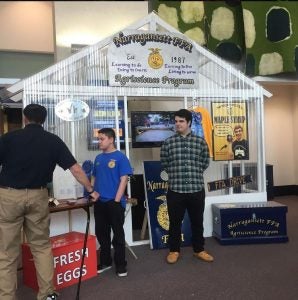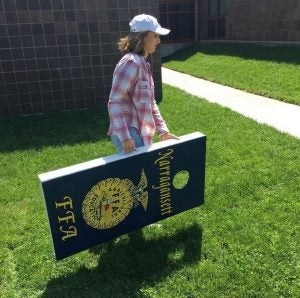When Greg Breene arrived at Narragansett High School 31 years ago, ag education was a small program included in the science department. There was no FFA.
“My mission as an eager graduate was to begin a full-fledged ag program with the FFA component,” Breene said. “We started small, and as I say to the past students — their successes, both in the class and in FFA, have led to what we have today — a state-of-the-art facility and a three-teacher program.”
One of three Rhode Island FFA chapters, Narragansett stands out not only because it is the largest chapter, but also because the chapter is thriving in an area of the state where there are essentially no farms.
“The Narragansett chapter highlights other types of involvement in agriculture, through CDE competitions, floriculture, and many other non-traditional aspects,” said Charles Ashworth, Narragansett FFA President. “We aim to involve as many students as possible and the tight knit status of our community provides support and knowledge of what we are doing and trying to accomplish.”
A junior at Narragansett High School, Ashworth has lived in the coastal beach community his whole life. With only one working farm nearby, Ashworth credits his early ag appreciation from his mother, Meredith Ashworth, who is also an ag education teacher at Narragansett High.
“Her career shaped my life and provided me with a different sort of agricultural background,” Ashworth said. “Every time we drive by her favorite tree, the Red Maple, she points it out and shows me Narragansett silt loam whenever it crosses our path, and always includes various fun facts about the organisms around me. This type of immersion into her knowledge of agriculture helped me to gain a quick understanding.”
While Ashworth had a bit of a leg up, many students at Narragansett have never been exposed to ag and because of Narragansett’s lack of open land available to farming, the FFA programs has focused on a more realistic way to show students how to grow their own food in the community.
In Agriscience II, students are encouraged to create an “edible pot” where lettuce, peppers, chives, and all other edible plants are assembled in an aesthetically pleasing way in one large pot and grown in the school’s state-of-the-art greenhouse. In Sustainable Ag each spring, Narragansett students raise, manage, and process broilers. Some of the birds are packaged for sale, while most are served for lunch at Narragansett FFA’s annual plant sale.
Narragansett’s maple production project started 20 years ago, after a student raised a question in class on how syrup was made. The Sugar Shack has now grown into a full-fledged sugar house with production of bottled syrup and candy. All trees are tapped on campus and in the community, and all processing takes place on school grounds.

“We are the only high school in Rhode Island with a sugar house, therefore I like to tell the students we are the #1 maple syrup producing high school in Rhode Island,” Breene said.
The school also stands out in the state because it is the only school to house a flock of 50 laying hens. For “Fresh Egg Friday,” each week, students manage the flock, collect and wash the eggs, and market them to faculty and the community. Stamping the eggs with an ‘N FFA’ logo, Narragansett is also working on teaching the students about brand loyalty with the project.
Food production isn’t the only successful program for Narragansett. The FFA chapter has also branched out in horticulture. Every spring the chapter hosts a huge plant sale on two consecutive weekends in May.
“About 15 years ago, we began to also showcase our students’ SAE projects to the delight of the community and the students,” Breene said. “Our plant sale has grown into an event that the community looks forward to and supports with gusto. It now is like a small festival.”
Ashworth says events, like the plant sale, provide a good platform for students to explore entrepreneurship and gain skills. It’s also been an easy way to boost membership.
“A student will, for example, make beeswax lip balm for their SAE and then they will sell it at our plant sale and cut a generous profit. This type of reward encourages students to keep on coming to our events,” Ashworth said. “While the plant sale incorporates incentives to join our wonderful chapter of the FFA, many students become involved because we strive to make our program fun at the same time as advancing the students involved in it.”
That fun extends into events such as the Rhode Island Woodsman Contest and Farm Olympics. Held three times a year, the Woodsman Contest is a fun, but skill-based event and includes a two-man saw, dot splitting, pulp throw, and log rolling.
The Farm Olympics is an end-of-the-year celebration for the Narragansett FFA members, as well as other Rhode Island FFA chapters. Students have the chance to participate in activities such as an egg toss, frozen chicken bowling, a pie eating contest, and an egg drop with the local fire department.

“We try to make each event fun and engaging so that more and more students become involved. Kids love to go out to the Sugar Shack and watch the sap they collected be turned into sweet maple syrup, the pie-eating at the Farm Olympics is hilarious, and the Woodsman provides an experience that many Narragansett residents could not otherwise be involved with,” Ashworth said. “Therefore, I only have to mention our meetings and competitions in order for students to join our program. The events prove how rewarding and fun the FFA is, they do the work for me.”
And as Ashworth points out the students come back for more because of the great experience they have had. In fact, many Narragansett alumni often return to help out at the plant sale and Farm Olympics.
“Many of my former students work in the landscape area, but with the expansion of our program we are proud to say more of our students are going into the animal science area and greenhouse management,” Breene said. “Having this type of exposure to so many ag endeavors has helped many students become involved in ag when they probably would not have even thought about it.”
Breene said his philosophy at Narragansett has always been that they didn’t really need an ag program, but if he worked hard enough to show the true value of ag education they would always want the program.
“By developing good solid programs and offering students meaningful experiences, the program will always be on solid footing,” Breene said. “Sometimes you need to think outside the box and do something different.”



